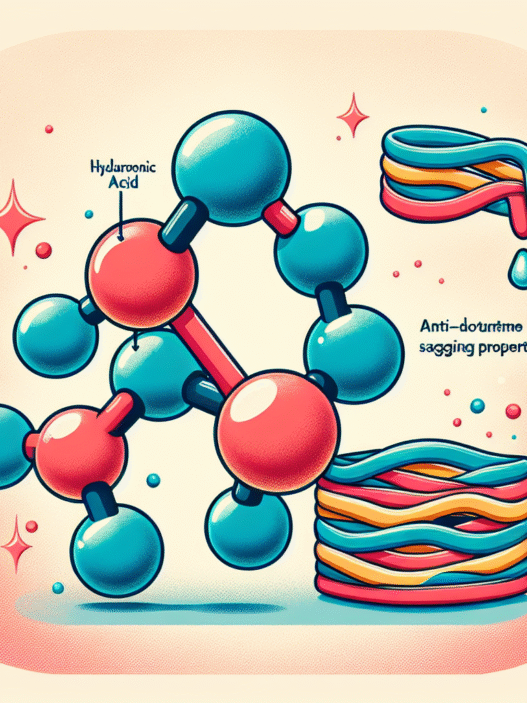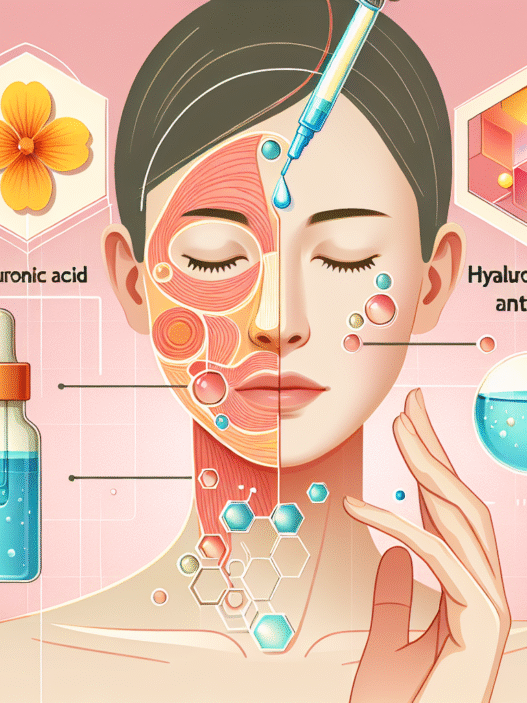Understanding Hyaluronic Acid
Hyaluronic acid is a naturally occurring glycosaminoglycan found throughout the body’s connective tissue. With age, the levels of hyaluronic acid decrease, making individuals more susceptible to sagging and wrinkles (Healthline). Understanding its functions and effects on skin hydration is essential for those seeking to improve their skin’s appearance through anti-aging methods.
Function of Hyaluronic Acid
Hyaluronic acid plays a critical role in maintaining skin health. One of its primary functions is to hold moisture, able to bind up to 1000 times its weight in water. This remarkable ability makes it an excellent ingredient for providing hydration to the skin, ensuring that it appears plump and supple. Proper hydration can help reduce the visibility of fine lines and wrinkles, contributing to a youthful appearance.
The best time to apply hyaluronic acid is when the skin is damp, which helps maximize its benefits. For instance, applying it right after a shower or post-toner can enhance hydration levels and provide optimal moisture retention.
Role in Skin Hydration
Hyaluronic acid acts as a humectant, ensuring that water molecules adhere to the skin’s surface. This action slows the evaporation of moisture from the skin, leading to better hydration levels overall. A study conducted in 2021 reported that applying topical hyaluronic acid twice daily resulted in improved skin hydration, roughness, and elasticity among participants aged 30 to 65 with signs of photoaging. Over six weeks, participants noted significant improvements in their skin condition (Medical News Today).
| Key Points | Details |
|---|---|
| Hydration Capacity | Can hold up to 1000 times its weight in water |
| Importance | Helps reduce the appearance of fine lines and wrinkles |
| Application Timing | Best applied on damp skin for maximum effect |
Utilizing hyaluronic acid can be a beneficial addition to any skincare routine focused on hydration and antiaging. For comprehensive insights, individuals may explore various hyaluronic acid products such as serums, moisturizers, and creams.
Types of Hyaluronic Acid
Hyaluronic acid (HA) comes in various forms, each with its molecular weight and benefits. Understanding these variations is important for anyone interested in the benefits of hyaluronic acid and anti-wrinkle properties.
Molecular Weights and Benefits
Hyaluronic acid is classified based on its molecular weight, expressed in kilodaltons (kDa). The molecular weight affects how deeply the acid can penetrate the skin and its overall efficacy. Studies indicate that HA with a molecular weight between 50 to 1,000 kDa is most beneficial for the skin, with approximately 130 kDa being the most effective. Notably, this specific molecular weight has been shown to increase skin elasticity by 20 percent within a month of treatment.
| Molecular Weight (kDa) | Benefits |
|---|---|
| 50 | Significant improvements in wrinkle depth and skin roughness observed after 60 days. |
| 130 | Optimal for skin elasticity, hydration, and wrinkle reduction. Increased elasticity by 20% after one month. |
| 500+ | More challenging for skin penetration; less effective in delivering hydration benefits. |
For individuals looking for skincare products, understanding these weights can help in selecting the right hyaluronic acid serum or cream for optimal results.
Penetration Efficiency
The ability of hyaluronic acid to penetrate the skin barrier is crucial for its effectiveness. A recent study revealed that smaller hyaluronic acid molecules, particularly those under 500 kDa, were more successful in passing through the skin barrier compared to larger molecules above this threshold. This highlights the importance of choosing products with appropriate molecular weights for better absorption and skin benefits (Healthline).
In summary, the molecular weight of hyaluronic acid greatly influences its benefits and penetration capabilities. For skincare enthusiasts seeking to maximize the advantages of HA, considering these factors when selecting products is essential. Additionally, products that combine hyaluronic acid with other complementary ingredients can further enhance results, promoting improved hydration and elasticity in the skin.
Using Hyaluronic Acid Products
Hyaluronic Acid Skincare Recommendations
Hyaluronic acid is widely recognized for its beneficial effects on skin hydration and appearance. For those looking to incorporate hyaluronic acid into their beauty routine, several types of products are available:
| Product Type | Key Benefits |
|---|---|
| Hyaluronic Acid Serums | Concentrated formulas that deliver intense hydration directly to the skin. Ideal for layering under a moisturizer. Refer to our article on hyaluronic acid serum for top picks. |
| Hyaluronic Acid Moisturizers | Creams that combine hyaluronic acid with other hydrating ingredients. Provides longer-lasting hydration. Check out our recommendations for hyaluronic acid moisturizer. |
| Hyaluronic Acid Injections | Professional treatments for deeper skin hydration and wrinkle reduction. Consult with a licensed practitioner for hyaluronic acid injections. |
| Hyaluronic Acid for Eyes | Specialized formulas designed to hydrate the delicate skin around the eyes, helping to reduce puffiness and fine lines. Explore more about hyaluronic acid for eyes. |
Hyaluronic acid is effective in increasing the moisture content of the skin, thereby reducing the appearance of wrinkles and promoting a plump and hydrated complexion. Over-the-counter products like serums and moisturizers are considered safe for most users, but it is crucial to choose quality products suitable for individual skin types (Healthline).
Effectiveness and Safety
When using hyaluronic acid products, it is important to recognize both their effectiveness and safety. Hyaluronic acid has proven to be a key ingredient in moisturizing products due to its capacity to hold significant amounts of water, making it exceptionally effective for skin hydration.
While most topical applications are safe, users should be aware of certain considerations:
- Side Effects: Products combining hyaluronic acid with other compounds may have risks of side effects. Always disclose your current medications to healthcare providers to adequately assess potential concerns.
- Professional Applications: Injections of hyaluronic acid must be performed by licensed health professionals to prevent severe complications. Over-the-counter applications are generally regarded as safe, but one should be conscious about selecting reputable brands and formulations.
For more insights on how hyaluronic acid can enhance your skincare routine and its associated benefits, consider visiting the sections on hyaluronic acid benefits and hyaluronic acid and anti-wrinkle.
Benefits for Skin Health
Hyaluronic acid is celebrated for its ability to enhance skin health significantly. Two primary benefits include improvement in skin flexibility and enhancement of skin elasticity.
Improvement in Skin Flexibility
Hyaluronic acid plays a crucial role in maintaining skin flexibility. It enhances the moisture content within the skin, making it more supple and pliable. According to research, applying topical hyaluronic acid twice daily can improve skin hydration, which directly influences skin flexibility. In a study, participants reported noticeable improvements in hydration and skin roughness after just six weeks of use (Medical News Today).
Hyaluronic acid’s unique ability to hold up to 1000 times its weight in water further supports skin flexibility. Proper hydration allows movement within the skin layers, which is essential for maintaining youthful, healthy skin.
| Aspect | Description |
|---|---|
| Hydration Capacity | Holds up to 1000 times its weight in water |
| Flexibility Improvement | Enhances moisture content, making skin more pliable |
Enhancement of Skin Elasticity
The elasticity of the skin determines how well it can stretch and return to its original shape. With age, the natural production of hyaluronic acid decreases, leading to loss of elasticity and increased susceptibility to wrinkles. Regular use of hyaluronic acid can counteract these effects by improving skin elasticity (Cleveland Clinic).
Hyaluronic acid aids in the regulation of inflammation and boosts blood flow to the tissues, supporting overall skin health and elasticity. This improvement in elasticity not only contributes to a smoother appearance but also plays a role in wound healing and skin repair, especially for minor wounds and surgical scars (Medical News Today).
| Benefit | Description |
|---|---|
| Improves Elasticity | Helps skin retain its stretch ability |
| Promotes Healing | Aids in wound healing and reduces scar appearance |
The combined benefits of hyaluronic acid contribute to a more youthful, hydrated appearance, reducing the visibility of fine lines and wrinkles. For those interested in incorporating hyaluronic acid into their routine, options include hyaluronic acid serum, hyaluronic acid moisturizer, and hyaluronic acid injections for enhanced hydration and skin rejuvenation.
Hyaluronic Acid in Anti-aging
Collagen Stimulation
Hyaluronic acid plays a significant role in stimulating collagen production within the skin. It is crucial for maintaining skin elasticity and firmness, attributes that tend to diminish with age. By promoting collagen synthesis, hyaluronic acid can effectively combat the visible signs of aging and support a youthful complexion. According to Skinician, the ingredient not only hydrates the skin but also boosts the structural proteins responsible for skin resilience.
Utilizing hyaluronic acid in topical applications or as part of hyaluronic acid injections can yield improved skin elasticity. A study highlighted that smaller molecules of hyaluronic acid, particularly those with a molecular weight of around 130 kDa, are most effective in penetrating the skin barrier, leading to tangible benefits in skin firmness and texture.
| Type of Hyaluronic Acid | Molecular Weight (kDa) | Effect on Collagen Production |
|---|---|---|
| Small Molecules | < 500 | High effectiveness |
| Optimum Molecule | 130 | Greatest improvement in elasticity and wrinkle depth |
| Larger Molecules | > 500 | Limited penetration |
Studies show that after a month of treatment with 130 kDa hyaluronic acid, participants experienced a 20% increase in skin elasticity. This suggests that including hyaluronic acid in anti-aging skincare routines may significantly contribute to healthier, more youthful skin.
Reduction of Wrinkles
Hyaluronic acid is renowned for its wrinkle-reducing properties. It can hold up to 1000 times its weight in water, making it a superlative hydrating ingredient. Proper moisture retention is essential for skin health, as it helps minimize the appearance of fine lines and wrinkles. When the skin is adequately hydrated, it appears plump and supple, effectively reducing the visibility of aging signs.
The application of hyaluronic acid should be performed on damp skin, immediately following a shower or after applying a toner for optimal absorption. Regular use can enhance the skin’s moisture content, promoting a smoother, more youthful appearance. Additionally, studies indicate that hyaluronic acid can aid in wound healing and improve rough textures on the skin.
| Key Benefits | Mechanism |
|---|---|
| Reduces Wrinkles | Increases skin hydration |
| Enhances Skin Texture | Supports moisture retention |
| Aids in Skin Healing | Improves overall skin health |
Incorporating hyaluronic acid into a daily skincare regimen can be a powerful strategy for those seeking to achieve a more youthful appearance. Explore options like hyaluronic acid serums or hyaluronic acid moisturizers that deliver concentrated benefits directly to the skin. Understanding the properties of hyaluronic acid provides valuable insight into effective anti-aging strategies that cater to individual skincare needs.
Best Practices for Hyaluronic Acid
Incorporating hyaluronic acid into a skincare routine can yield remarkable benefits, particularly for anti-aging purposes. Here, we outline the best practices regarding application techniques and complementary skincare ingredients that enhance the effectiveness of hyaluronic acid.
Application Techniques
To maximize the benefits of hyaluronic acid, proper application techniques are essential. Here are some best practices:
-
Cleanse the Skin: Start with a clean face using a gentle cleanser to remove impurities.
-
Apply on Damp Skin: Hyaluronic acid works best when applied to slightly damp skin. This helps it to bind moisture more effectively, allowing it to lock in hydration.
-
Use a Few Drops: A small amount usually suffices. About 2-3 drops of a quality hyaluronic acid serum can be applied to the face and neck.
-
Layering: For optimal hydration, follow the serum application with a hyaluronic acid moisturizer to seal in the moisture.
-
Frequency of Use: It is recommended to use hyaluronic acid products once or twice a day, depending on the individual’s skin type. Overuse may lead to dehydrated skin as it might draw moisture from deeper layers (Skinician).
Complementary Skincare Ingredients
Using complementary ingredients can significantly enhance the results of hyaluronic acid. Here are some beneficial allies:
| Ingredient | Benefits |
|---|---|
| Vitamin C | Boosts collagen production and brightens skin tone. |
| Peptides | Support skin structure and improve firmness. |
| Niacinamide | Enhances skin barrier function and reduces redness. |
| Glycerin | Another humectant that attracts moisture to the skin. |
| Retinol | Promotes cell turnover and further reduces signs of aging. |
Combining hyaluronic acid with vitamin-rich serums can improve hydration and overall skin health, making the skin appear plumper and more youthful. For those seeking deeper results, hyaluronic acid injections can offer immediate effects.
Understanding these best practices can help in utilizing hyaluronic acid effectively, reducing the appearance of wrinkles and contributing to overall skin health. For an in-depth look at hyaluronic acid’s effects, explore our articles on hyaluronic acid and skin care and hyaluronic acid benefits.





















